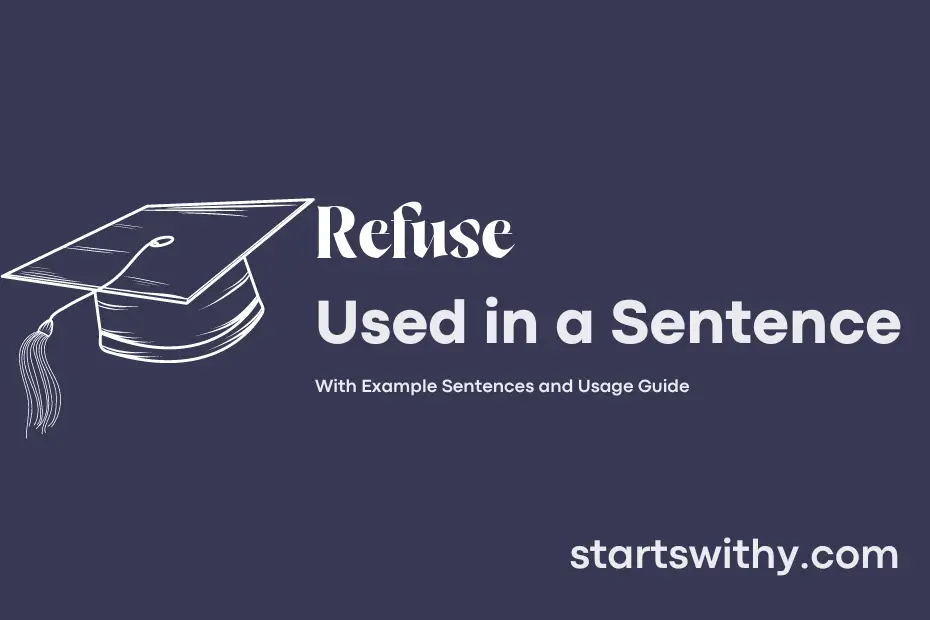Is refusing to budge on a decision always a bad thing? The word “refuse” is commonly used when we decline to accept or comply with something. It can be a strong and assertive action that showcases our boundaries and convictions.
Sometimes refusing can lead to standing firm in our beliefs, while other times it may hinder progress or create conflict. Understanding when to refuse and when to compromise is key in navigating various situations effectively.
7 Examples Of Refuse Used In a Sentence For Kids
- I refuse to eat my vegetables today.
- She refuses to share her toys with her sister.
- They refuse to go to bed early at night.
- He refuses to wear his new shoes to school.
- We refuse to talk in class when the teacher is speaking.
- The cat refuses to come inside the house.
- The dog refuses to fetch the ball.

14 Sentences with Refuse Examples
- REFUSE to procrastinate and start studying for exams well in advance.
- Make sure to refuse any distractions while working on important assignments.
- REFUSE to skip classes, as it can impact your overall understanding of the subject.
- It’s important to refuse unhealthy food options and opt for nourishing meals instead.
- REFUSE to submit plagiarized work and always cite your sources properly.
- Don’t be afraid to refuse group study sessions that are not productive for you.
- Make it a habit to refuse negative influences that can hamper your academic performance.
- REFUSE to compromise on your values and ethics, even in challenging situations.
- It’s crucial to refuse peer pressure when it comes to unhealthy habits like substance abuse.
- Always remember to refuse any form of discrimination or unfair treatment in college.
- REFUSE to settle for mediocrity and strive for excellence in everything you do.
- Don’t hesitate to refuse unreasonable requests that can overwhelm you.
- REFUSE to give up on your dreams and keep pushing yourself towards success.
- When facing academic challenges, it’s important to refuse defeat and seek help when needed.

How To Use Refuse in Sentences?
To use “Refuse” in a sentence, follow these steps:
- Understand the meaning: The word “Refuse” can be used as both a noun and a verb. As a noun, it refers to waste or items that are discarded. As a verb, it means to reject or say no to something.
- Context: Determine whether you want to use “Refuse” as a noun or a verb in your sentence.
- As a noun: When using Refuse as a noun, you are referring to trash or garbage. For example, “The refuse bins were overflowing with garbage.”
- As a verb: When using Refuse as a verb, you are expressing a rejection of something. For example, “I will refuse to participate in any unethical activities.”
- Practice: Try using Refuse in different sentences to become more comfortable with its usage. For example, “She decided to refuse the job offer because it did not meet her expectations.”
- Check the meaning: Always ensure that the sentence makes sense and conveys the intended meaning when using the word Refuse.
Remember to pay attention to the context in which you are using the word Refuse to ensure that your sentence is clear and accurate. With practice, you will become more confident in incorporating it into your writing.

Conclusion
In conclusion, the various examples of sentences containing the word “refuse” illustrate a range of contexts in which this term can be used. From refusing an offer or request to rejecting an idea or belief, the word “refuse” emphasizes the act of saying no or declining something. Whether it’s a refusal to comply with instructions, decline a proposal, or deny a statement, the word “refuse” conveys a clear message of rejection or denial.
By examining these sentences, we gain insights into the different ways in which individuals can express their refusal in various situations. Overall, understanding the nuances of using “refuse” in sentences can help improve communication skills and convey rejection or denial effectively in different settings.



